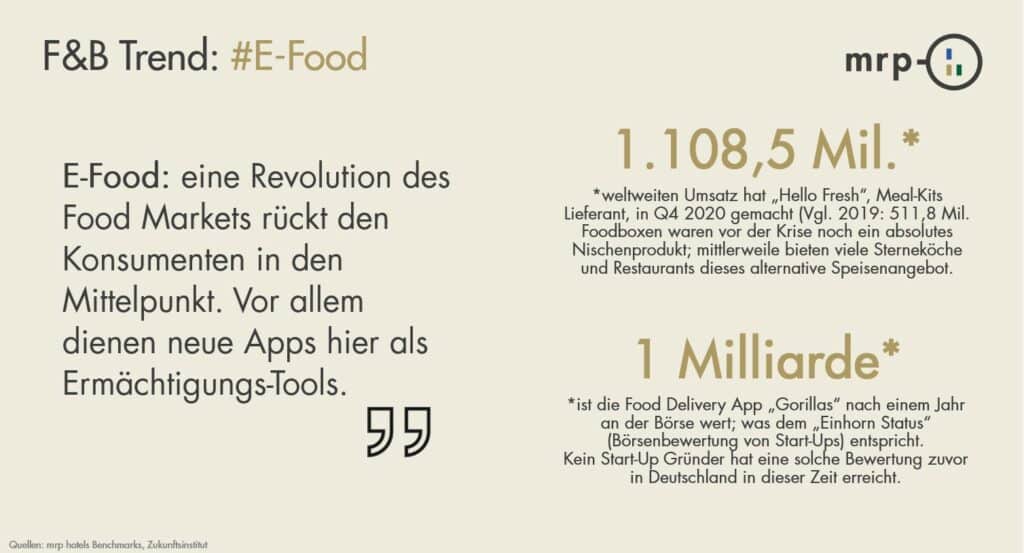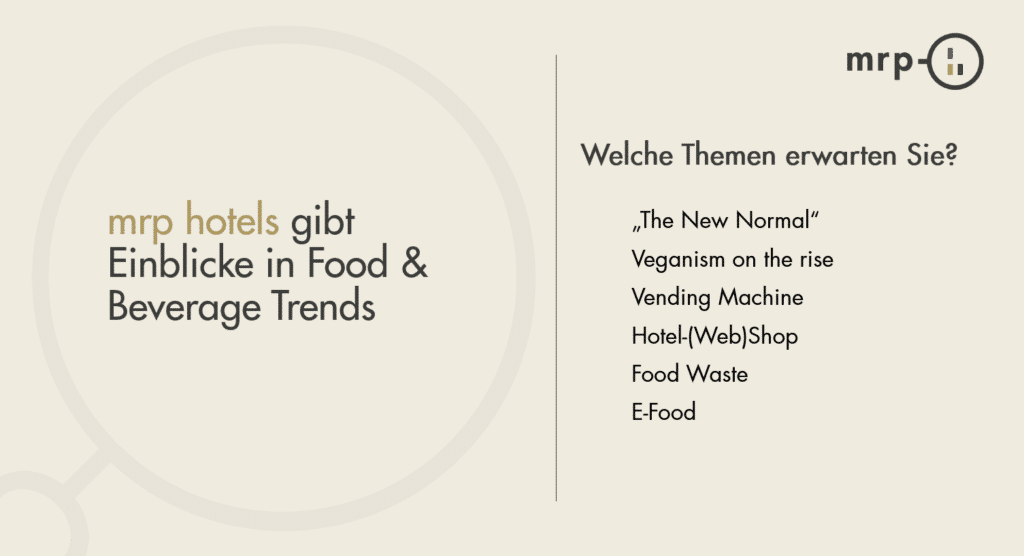mrp hotels has summarised the latest trends in the food & beverage sector, some of which have been accelerated by Corona. The current topics under the keywords: The New Normal, Veganism on the rise, the Vending Machine, the Hotel-(Web)Shop, Food Waste and E-Food.
The New Normal
The crisis brought food closer to people again. More time was taken for meals again and eating was often seen as the “highlight” of the day. The topic of sustainability in the ecological and social sense has become a new quality criterion. This was confirmed in a survey conducted last year. mrp hotels has summarised the latest trends in the food & beverage sector, some of which have been accelerated by Corona. The current topics under the keywords: The New Normal, Veganism on the rise, the Vending Machine, the Hotel-(Web)Shop, Food Waste and E-Food.
For example, 69% of respondents in a 2020 survey said that they prefer to buy regional products. This corresponds to an increase of around 14% compared to 2013. There was also more demand for fair products in 2020. An increase of 25% of consumers value these more than in 2013. Likewise, sales of organic food have increased by around 23% compared to the previous year 2019. Lastly, 41% of respondents pay attention to sustainability when buying, which represents a growth of 20% compared to 2016.
Survey results are based on a survey of the German-speaking population aged 14 and over.
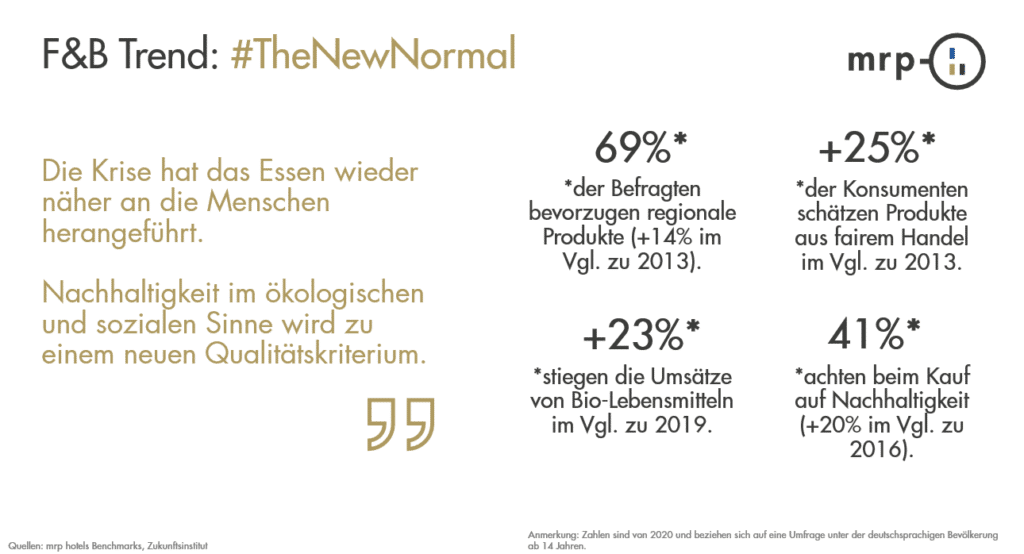
Veganism on the rise
More and more people are consciously paying attention to a meat-free or meat-reduced diet. The change in awareness is mainly due to climate change and global warming. In connection with global warming, attention is often drawn to the harmful production of meat and the potential that a sustainable diet brings to do something for the climate.
A recent survey conducted by the scientific journal Foods confirmed the conscious reduction of meat consumption. 42% of Germans said they consciously reduce their meat consumption by eating a vegetarian, vegan, pescetarian or flexetarian diet. More and more people are consciously paying attention to a meat-free or meat-reduced diet. The change in awareness is mainly due to climate change and global warming. In connection with global warming, attention is often drawn to the harmful production of meat and the potential that a sustainable diet brings to do something for the climate.
The “Veganuary” campaign, which originated in the UK and encourages vegan eating in the month of January, has also benefited from this development. With a total of 582,532 registrations, the campaign was able to achieve twice as many registrations in 2020 than in the previous year.
There is further “evidence” from Lieferando, a food delivery service. In Hamburg, for example, 166% more vegan dishes were ordered in 2020 than in the previous year. Besides Hamburg, such developments were also heard in other major cities such as Vienna, Berlin and Munich.
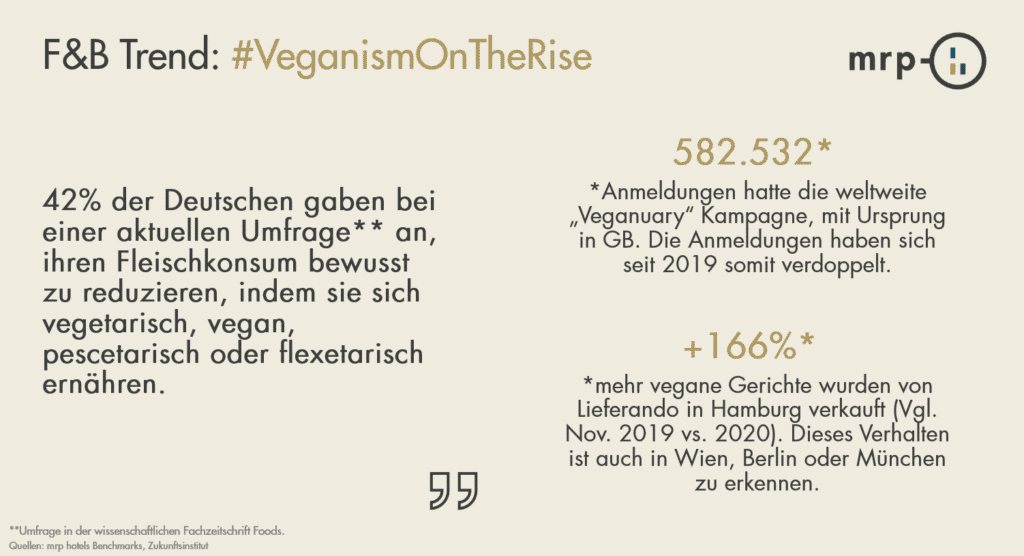
Vending Machine
The “Vending Machine” offers the possibility to replace the classic minibar with a modern vending machine. The concept has gained in popularity, not least because of the great shortage of skilled workers in the hotel and catering industry. It should be noted that especially lifestyle products benefit from this concept (compared to upper upscale or luxury products), so the product is not a “one-way fits all” solution.
In addition to the advantages for the daily operational business in the hotel, the vending machine also offers comfort for the hotel guests. The guests’ need for flexibility is met and round-the-clock supply is ensured. For the hotel, the vending machine means above all a cost saving with regard to the infrastructure in the room and the overall personnel expenditure. Furthermore, the vending machine is perceived by the guest as more cost-effective than a minibar, which results in a higher willingness to buy.
Probably the most famous example of a vending machine can be found in London’s Bankside Hotel. Here, guests can buy champagne and Tom Ford sunglasses as well as a “placeholder” engagement ring.
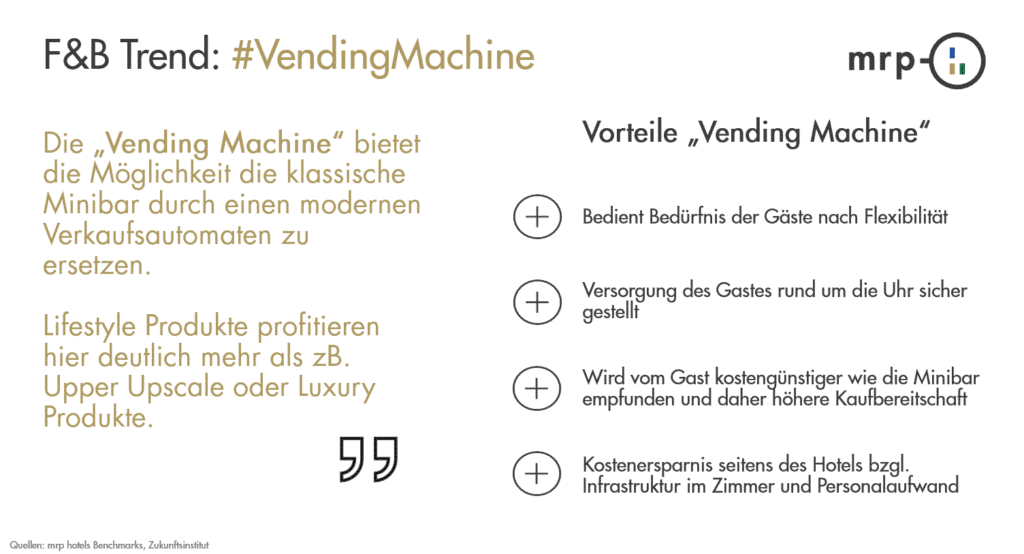
Hotel (Web)-Shop
Due to the closure of the hotel businesses, many initiatives were created to still generate revenue and be there for customers. The first web shops were implemented to generate a reliable revenue stream even in times of crisis. Moreover, it has been no secret for a long time that new products are tested and presented to customers in the relaxed atmosphere of a hotel. In retail, hotels are already considered the retail experts of the future because of their service excellence. In addition to a classic product range, a hotel shop offers the optimal platform to sell hotel brands as a reminder of a relaxing holiday.
On average, the hotel shop in a resort or holiday hotel contributes 5-10% of the total annual turnover. The hotel should focus on the sale of equally positioned products and own brands in its own shop.
Since the Corona crisis, enjoyment has become even more central to society and the willingness to spend a little more money has increased. Above all, a good bottle of wine with a dinner is very much appreciated.
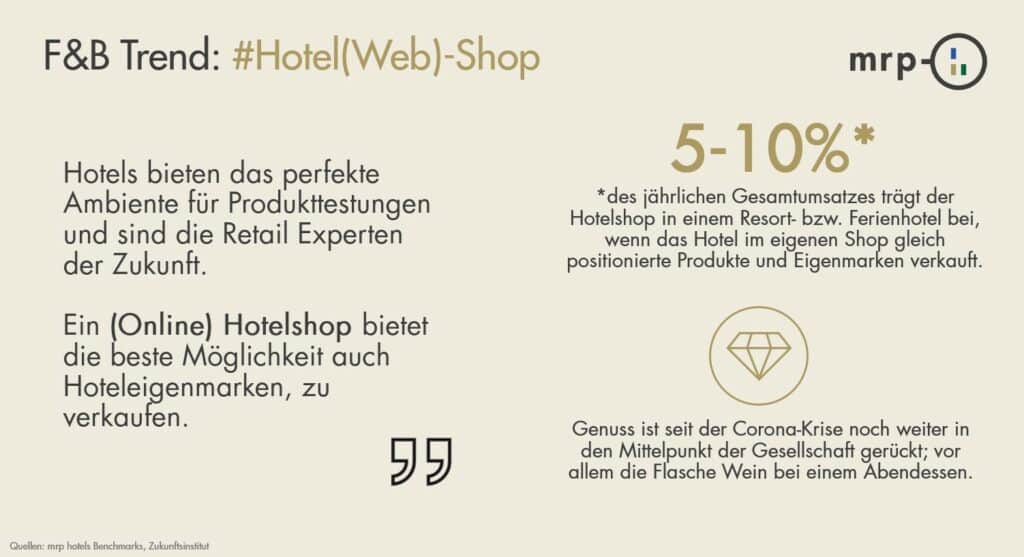
Food Waste
A total of 88 million tonnes of food are wasted worldwide every year. This corresponds to 20% of all food produced. Calculated down to a single person, this corresponds to 173 kg of food wasted over the entire year.
Here, the Corona-related obligation to make reservations in the restaurant and the predominance of table service have made a positive contribution, as about 20-30% more food waste is produced, especially in the case of a buffet, in contrast to table service.
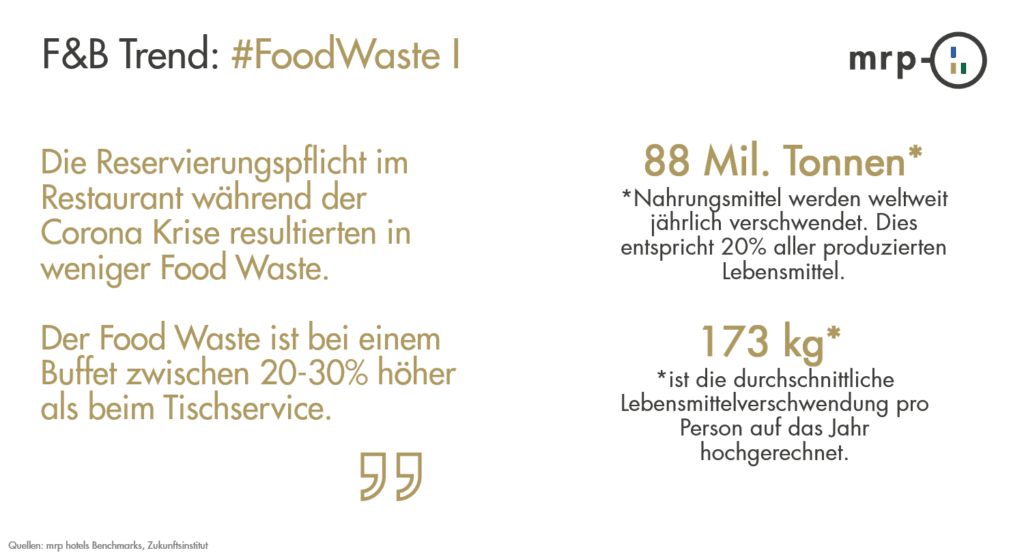
What strategies can be developed in the hotel and catering industry to counteract this food waste?
Reservation Only – Consumption in the restaurant is only possible with a prior reservation. This allows for an accurate calculation of the amount of food and necessary groceries. Food waste can thus be kept below 5%.
Pay what you eat – In contrast to a buffet, only ordered food is served to the guest. This results in 20-30% less food waste in operations, but requires trained staff. Table service is also popular with restaurants due to a generally higher turnover, as additional food and drinks are sold to the guest through clever upselling.
Family Style – Some dishes are placed in the middle of the table and additional service is available on request. As with the buffet, less service staff is required and a large number of people can be served. Furthermore, Family Style offers a shared experience at the table without the need to get up as with the buffet.
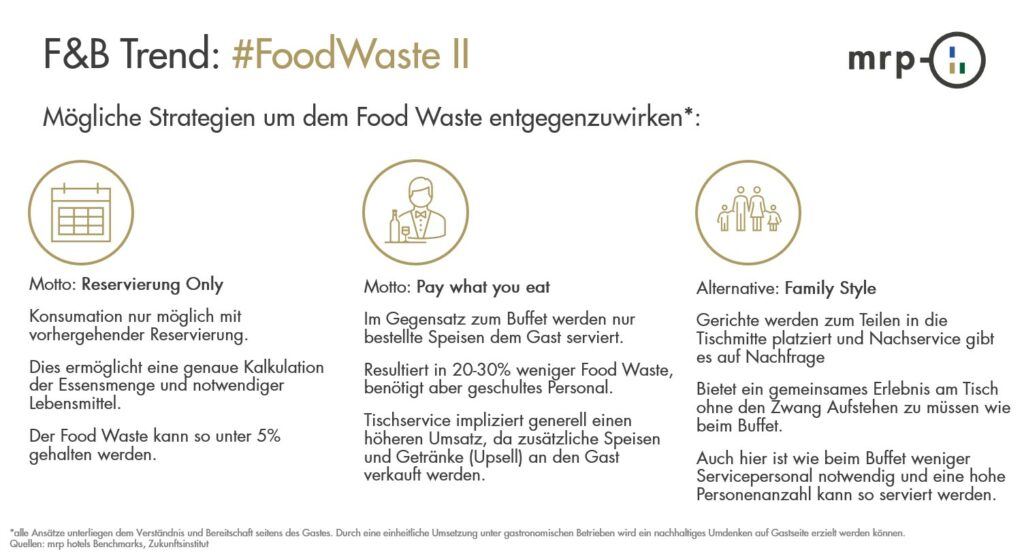
E-Food
E-food refers to a revolution in the food market that focuses on and empowers the consumer. Above all, new apps serve as empowerment tools for the consumer. Due to the Corona crisis and the need to conduct business as “contactless” as possible, technology-savvy concepts that rely on the trend of digitalisation have profited the most.
Key examples of this success are “Hello Fresh” and “Gorillas”:
1,108.5 million in global sales was achieved by “Hello Fresh”, a meal-kit supplier, in the last quarter of 2020. The company had gained more exposure mainly due to the Corona crisis, and was able to increase sales significantly from 511.8 million in 2019. Before the crisis, food boxes were an absolutely niche product. In the meantime, many star chefs and restaurants offer this alternative meal option, in which meals are pre-cooked and can simply be cooked at home.
1 billion is the value of the food delivery app “Gorillas” after one year on the stock market. This corresponds to the “unicorn status”, a well-known stock market valuation of start-ups. Never before in Germany has a start-up founder achieved such a valuation in such a short time.
